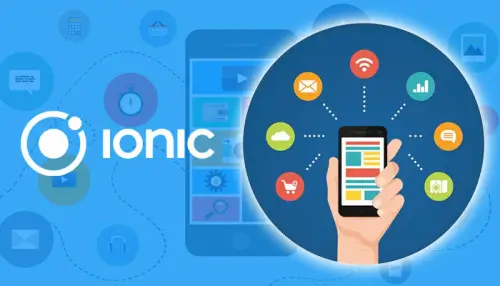In today’s fast-paced digital landscape, mobile app development has become an integral part of any business strategy. Among the various frameworks available, Ionic has emerged as a popular choice for developing cross-platform mobile applications. To create exceptional Ionic apps, developers must adhere to best practices that ensure high performance, code quality, and a seamless user experience.
In this blog post, we will explore the best practices followed by top Ionic app developers, emphasizing the significance of these practices for building successful apps.
Understanding Ionic
Ionic is an open-source framework that enables developers to build high-performing, cross-platform mobile applications using web technologies such as HTML, CSS, and JavaScript. By utilizing Ionic, developers can create applications that can be deployed on various platforms, including iOS, Android, and the web. This unique feature of Ionic saves both time and resources, making it a preferred choice for businesses aiming to reach a wider audience.
Refer our blog page to know more about Ionic development.
The Role of Ionic App Developers
Ionic app developers are skilled professionals who possess a deep understanding of web technologies and mobile app development. They are proficient in using Ionic’s vast ecosystem, which includes Ionic CLI, Ionic Components, and Cordova plugins, to create robust and feature-rich applications.
1. Cross-Platform Development Expertise
One of the primary advantages of Ionic app developers is their ability to create applications that work seamlessly on different platforms. By leveraging Ionic’s single codebase, developers can build once and deploy everywhere, saving time and effort compared to developing separate applications for each platform. This cross-platform compatibility also ensures consistent user experiences across devices, enhancing customer satisfaction.
2. Web Technology Proficiency
Ionic app developers are well-versed in web technologies such as HTML, CSS, and JavaScript. This knowledge allows them to utilize their web development skills in building hybrid applications. They can leverage their expertise in responsive design and web development best practices to create visually appealing and user-friendly interfaces for Ionic apps.
3. Access to Ionic Ecosystem
Ionic app developers have access to a rich ecosystem of tools, resources, and plugins provided by the Ionic framework. This ecosystem empowers developers to add native-like functionalities to their applications, such as camera access, geolocation services, push notifications, and more. By harnessing the power of these plugins, Ionic app developers can deliver a seamless user experience while taking advantage of device-specific features.
4. UI/UX Design Excellence
Creating visually appealing and intuitive user interfaces is crucial for the success of any mobile application. Ionic app developers are proficient in Ionic’s UI components, which follow the principles of Material Design and iOS Human Interface Guidelines. They have the skills to design aesthetically pleasing interfaces and ensure optimal usability, resulting in engaging and user-friendly applications.
5. Continuous Adaptation to Updates
The world of technology is ever-evolving, and frameworks like Ionic continuously release updates and new features to keep up with the latest trends. Ionic app developers stay up-to-date with these changes and adapt their skills accordingly. This enables them to leverage the latest advancements in the framework, incorporate new functionalities, and deliver cutting-edge solutions to their clients.
Best Practices Followed by Ionic App Developers
1. Stay Up-to-Date with Ionic
As an Ionic app developer, it is essential to stay current with the latest updates, features, and enhancements in the Ionic framework. Regularly check the official Ionic website, community forums, and GitHub repository to stay informed about new releases, bug fixes, and improvements. By utilizing the latest version of Ionic, you can take advantage of performance enhancements, security patches, and new functionalities.
2. Plan App Architecture and User Experience
Before diving into development, spend time planning the app’s architecture and user experience (UX). Create wireframes, design mockups, and flowcharts to map out the app’s structure and navigation. Consider user personas, target audience, and user feedback to design an intuitive and visually appealing app interface. A well-thought-out architecture and UX strategy contribute significantly to user satisfaction and engagement.
3. Optimize Performance
Performance optimization is crucial to deliver a responsive and smooth user experience. Ionic apps rely on web technologies like HTML, CSS, and JavaScript, which can impact performance if not optimized correctly. Minimize network requests, reduce unnecessary computations, and implement lazy loading techniques to improve app loading times. Use efficient data caching strategies to minimize data transfer and reduce server overhead.
4. Write Modular and Maintainable Code
Ionic apps are built using Angular, a powerful JavaScript framework. To ensure maintainability and scalability, follow modular coding practices. Break your code into reusable components and modules, adhering to the Single Responsibility Principle (SRP). Keep your codebase organized, maintain clear naming conventions, and write meaningful comments. Utilize linters and static code analysis tools to enforce coding standards and identify potential issues early on.
5. Leverage Native Device Capabilities
Ionic provides native plugin integration, enabling access to device-specific features like camera, GPS, push notifications, and more. When appropriate, leverage these native capabilities to enhance the app’s functionality and provide a seamless user experience. Ensure that the plugins you use are well-maintained, regularly updated, and compatible with the target platforms.
6. Test and Debug Rigorously
Thorough testing and debugging are essential for identifying and fixing issues before deploying your Ionic app. Employ automated testing frameworks like Jasmine and Karma to perform unit tests, end-to-end tests, and integration tests. Use device emulators, simulators, and real devices for testing on various platforms. Continuously monitor app performance, track crashes, and gather user feedback to identify areas for improvement.
7. Ensure App Security
App security is a critical aspect of any mobile application. Implement secure authentication mechanisms, encrypt sensitive data, and validate user inputs to mitigate common security vulnerabilities. Stay updated on the latest security best practices and guidelines provided by the Ionic framework, as well as platform-specific security guidelines for iOS and Android.
8. Continuous Integration and Deployment
Implement a robust CI/CD (Continuous Integration/Continuous Deployment) pipeline to streamline the development, testing, and deployment process. Automate build processes, version control, and app distribution to ensure a seamless workflow. Leverage popular CI/CD tools like Jenkins, CircleCI, or GitLab CI/CD for efficient and error-free app deployment.
Conclusion
At OdiTek, our ionic app developers team stays up-to-date with the latest Ionic advancements, allowing us to leverage the most recent features and enhancements. From planning app architecture and user experience to implementing performance optimization techniques and ensuring app security, we follow best practices every step of the way. With our focus on modular and maintainable code, rigorous testing and debugging, and seamless CI/CD deployment processes, we are committed to delivering a high-quality Ionic app that meets your business goals and engages your target audience effectively.
Contact us today to know more about our Ionic app development services.







